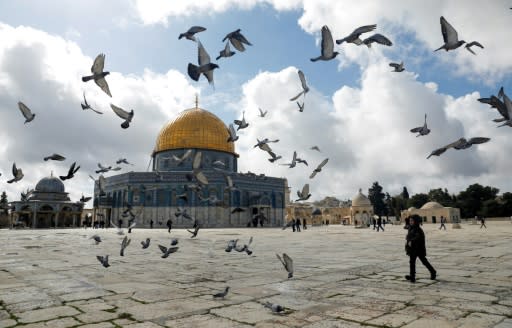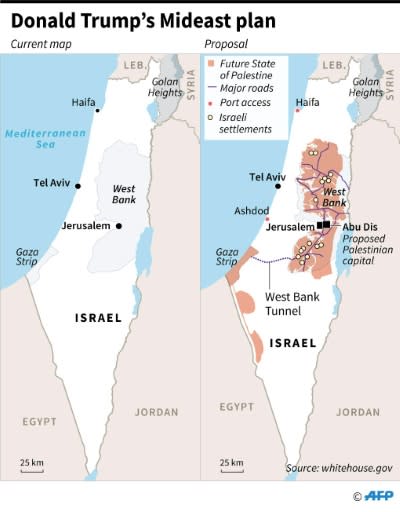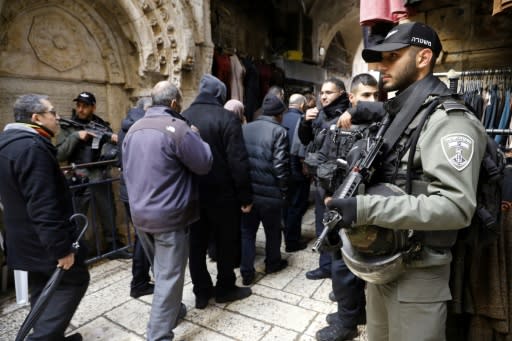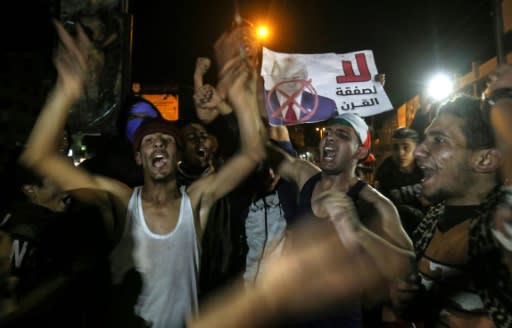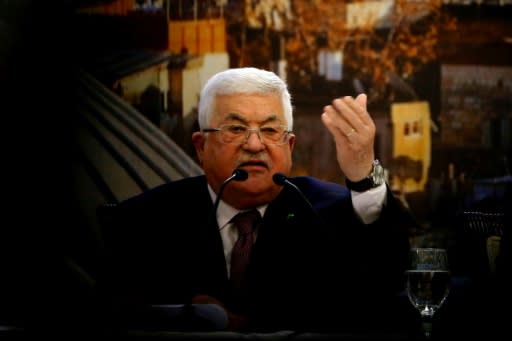Israel tightens security after Trump plan but prayers pass calmly
Israel stepped up security in Jerusalem's Old City Friday after US President Donald Trump enraged Palestinians with his controversial peace plan, but weekly prayers at the flashpoint Al-Aqsa mosque passed off calmly. The plan released on Tuesday was seen as heavily biased towards Israel and was angrily rejected by Palestinians, with one of the key bones of contention being its classification of Jerusalem as Israel's "undivided capital". Palestinians have long seen the city's eastern sector, which was occupied by Israel in 1967, as the capital of their future state. Fears of tensions were raised Friday morning when a group of Palestinians protested at the Al-Aqsa compound in east Jerusalem after dawn prayers. Israeli police "responded and dispersed the gathering," police spokesman Micky Rosenfeld said, adding the protesters had chanted "nationalist" slogans. But noon prayers, when more than 30,000 Palestinians attended the mosque, passed without incident, religious officials and AFP journalists said. The weekly prayers have previously been a rallying point for demonstrations. The Al-Aqsa mosque is the third-holiest site in Islam and also the most sacred for Jews, who revere it as the location of the two biblical-era Jewish temples. The Trump plan gives Israel the green light to annex the strategic Jordan Valley -- constituting some 30 percent of the West Bank -- and all Israeli settlements, which number more than 200, including those in annexed east Jerusalem. The settlements are home to some 600,000 Israelis, but are considered illegal under international law. Britain on Friday cautioned Israel against "any such unilateral moves", saying they would be "damaging to renewed efforts to re-start peace negotiations, and contrary to international law". "Changes to the status quo cannot be taken forward without an agreement negotiated by the parties themselves," the UK foreign office said in a statement. After Trump presented the plan, flanked by Israeli Prime Minister Benjamin Netanyahu, officials said they would swiftly submit an annexation bill to cabinet on Sunday. But the situation seemed less clear Friday, after Trump's adviser and son-in-law Jared Kushner said a decision would be best left until a new Israeli government has been formed after March 2 polls. - Gaza protests, rockets - The acting head of the UN agency for Palestinian refugees, Christian Saunders, said Friday that Palestinians were in a "state of shock" over the US plan. "We certainly have serious concerns that it will result in an escalation in clashes and in violence," he added. At least 30 Palestinians have been wounded since Tuesday in clashes with Israeli forces in the West Bank, although the demonstrations have mostly been small. In Hamas-controlled Gaza, thousands gathered for demonstrations this week. Many more donned badges proclaiming "no to the deal of the century". There has been some rocket fire from Gaza into Israel, but on nothing like the scale of barrages launched during multiple flare-ups last year. Israel carried out air strikes on Hamas targets in Gaza early Friday after three rockets were fired the previous evening, causing neither casualties nor damage, the army said. Later Friday, the Israeli army said that three mortar rounds were fired from Gaza into Israel -- with no reported casualties -- prompting a retaliatory strike by a tank on a "Hamas military post" in the south of the enclave. The military reported another, unspecified "projectile" was fired from Gaza after dark and intercepted by aerial defences. Hamas and Israel have fought three wars since 2008, but over the past year, the Islamists have gradually shaped an informal truce with Israel, under which the Jewish state has eased its crippling blockade of Gaza in exchange for calm. - Quest for Arab support - The Palestinians have sought to rally international support against Trump's plan, which they see as illegal and a violation of their rights. "What we're trying to do here is to get international consensus behind us, behind president Mahmud Abbas and his determination to achieve peace," said Palestinian chief negotiator Saeb Erekat. But there was a muted response, even within the Arab world. Both Egypt and the Gulf Arab states held off on any immediate criticism of their US ally, saying they would study the plan's contents. Those governments have quietly moved closer to Israel in recent years amid shared hostility towards Iran. Turkish President Recep Tayyip Erdogan on Friday accused some Arab countries of "treason" for backing the US plan, singling out Saudi Arabia, the United Arab Emirates, Bahrain and Oman for criticism. Abbas will try to rally opposition at an emergency meeting of the Arab League in Cairo on Saturday. Weekly prayers at the flashpoint Al-Aqsa mosque passed off calmly Map of Israel and Palestinian territories showing a proposed Mideast plan of US President Donald Trump, announced in Washington on Tuesday. Israeli police keep a watchful eye on Palestinians headed to the main weekly prayers at Jerusalem's flashpoint Al-Aqsa mosque Palestinians demonstrate against the Trump plan in the southern Gaza Strip town of Rafah Palestinian president Mahmud Abbas will try to rally opposition to the Trump plan at an emergency meeting of the Arab League in Cairo on Saturday

